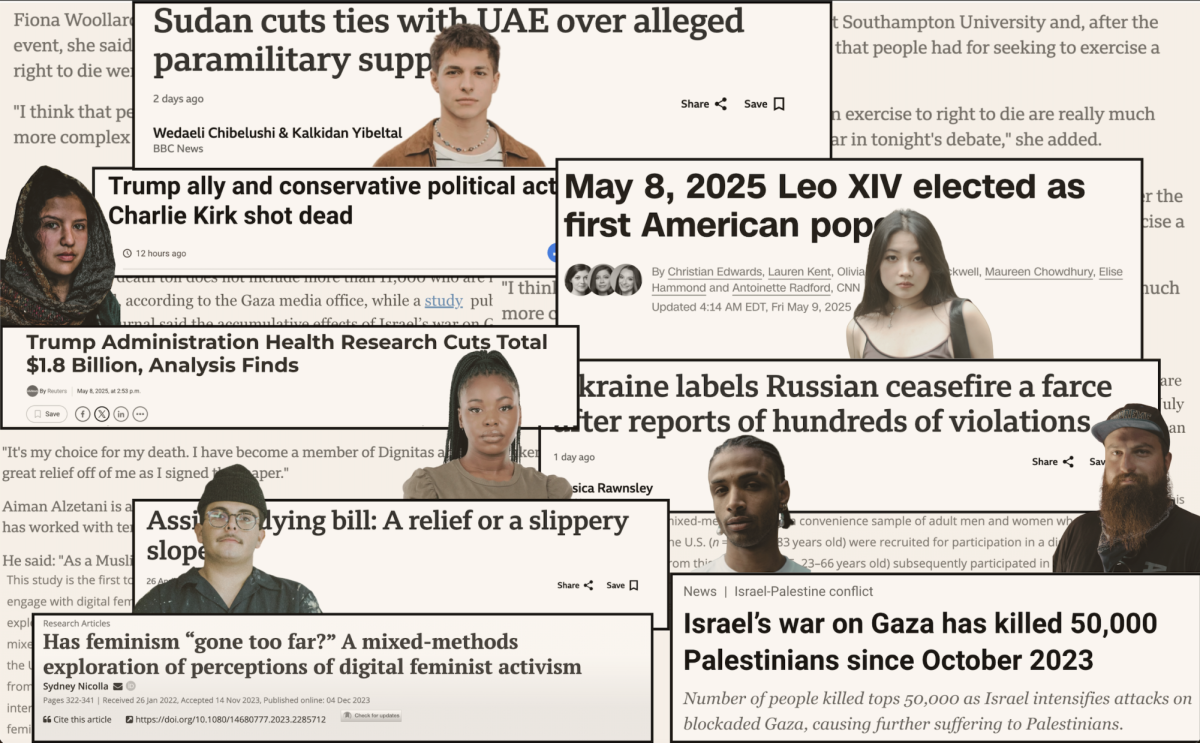We sat in rows under humming fluorescent lights, fanning ourselves with crumpled paper schedules. It was the first day of summer camp, and the room buzzed with quiet nerves. The projector at the front of the auditorium flickered on and switched to the first slide:
“Rule 1: Don’t talk about politics.
“Rule 2: Don’t talk about religion.”
Heads nodded around me. I was confused. Why not?
If these “rules” feel familiar, it’s because they seem to govern much of how we navigate everyday conversations. Politics and religion are usually seen as taboo topics at school, in social gatherings, and sometimes even at the dinner table. Why do we shy away from the very topics that are often most important both to our communities and to our individual beliefs?
A quiet crisis is unfolding before our eyes, becoming more urgent by the day. We’re in the midst of a social and political climate that will likely be studied for generations to come.
Every day, we’re confronted with shocking headlines provoking strong emotional reactions about important issues. Yet meaningful in-person dialogue is hard to find. Instead, opinions are posted online as one-way attacks reverberating in their own echo chambers rather than as genuine attempts to listen and understand. Somehow, we’ve been conditioned to think that talking about sensitive but important issues—potentially making ourselves and others feel uncomfortable—is a bad thing.
But we can’t expect to learn and grow without discomfort. When we avoid dialogue, we don’t just lose opportunities to grow—we enable the spread of misunderstanding, distrust, and division. Silence doesn’t protect us; it isolates us. Every time we back down from what matters, we train ourselves to be smaller and quieter until one day, we don’t know how to speak up at all.
We can do better. Positive change requires a profound shift in how we conduct important discussions—moving past our reservations, seeking understanding, and listening to ideas that challenge us. By engaging in meaningful dialogue where both sides feel heard and respected, we can create a stronger culture of openness and understanding.
Why aren’t we having these discussions at ASIJ? Perhaps because it’s hard—the discomfort compels us to choose silence over dialogue. However, by avoiding difficult conversations, we risk staying trapped in our own feedback bubbles, hearing only what we already believe and missing the depth other perspectives might offer. There is room, however, for us to connect productively on topics that provoke genuine thought and force us to articulate our worldview.
I asked ASIJ high school students how they feel about discussing difficult topics like politics and religion. The responses were strikingly consistent. While there was an undeniable sense of unease and risk, nearly all students recognized that avoiding these topics limits growth, both individually and as a community. As one 11th grader commented in a survey, “Engaging in such conversations helps you understand not only other perspectives but also your own.” Conversation allows us to see the important nuances that cannot be captured in a simple headline or a social media post.
I’ve noticed first-hand the desire many have to engage more deeply. But with this desire also comes fear. “A difficult conversation can be harmful when it leads to weakened relationships, arguments taken personally, and general bad vibes,” one student shared. Conversations about politics and religion can easily feel like ad hominem attacks rather than genuine discussions. Another student noted, “This is often the problem most people encounter, where they are unable to listen to others with the right mindset, which often results in heated arguments.” Many admitted they avoid these discussions altogether because they don’t want to risk friendships.
Some of this risk comes from the difficulty of showing empathy when core beliefs are being challenged. As one student put it, “I tend to be stubborn and opinionated, which is great when I talk to people I agree with, but it’s hard to keep the relationship and topic as two separate things when it’s over a disagreement.” It’s easy to see how these conversations, if not handled carefully, can turn from stimulating to toxic. Navigating the logical and emotional complexity of what’s being discussed, with an open mind and assuming the best of others’ intentions, requires practice. It’s our responsibility to develop both the courage and the skills to confidently engage.
Experts agree that the key to maintaining respect is to approach sensitive conversations with curiosity, not judgment. Monica Guzman, author of I Never Thought of It That Way, urges people to assume there’s a good reason someone believes what they do, and that it’s our job to find out what it is. Dr. Liane Davey, author of The Good Fight, stresses the importance of “listening with the intent to understand, not to rebut.” Research from the Greater Good Science Center also suggests that approaching conversations with humility, recognising that our views are incomplete, helps preserve relationships even when disagreements arise.
So are these conversations worth the risk of discomfort? Yes, they can be sensitive, but we must challenge ourselves to listen, engage, and learn from others who see the world differently. Rather than living in an environment where we only hear things we agree with, we need to open ourselves up to the potential discomfort of engaging with diverse perspectives. We say we’re being respectful and mature— merely keeping the peace. But it’s never been about respect, maturity, or genuine peace—it’s fear disguised as etiquette.
As an ASIJ community, we can create an environment where challenging ideas can be discussed respectfully and openly, where we can begin to see the world with more nuance, instead of just in black and white—not only in our classrooms, but in our friend groups, at the dinner table, and in all the in-between moments. In today’s increasingly polarised world, this change is more urgent and important than ever.
So the next time you’re with friends and someone brings up a political headline (even if you know it might get tense), don’t change the subject. Let the conversation happen. Pause, listen with genuine curiosity, and try to understand why it matters to them. When someone you trust voices something that clashes with your deepest values—something that stirs frustration, hurt, or even disbelief—pause, stay, and listen. Challenge the idea instead of the person.
Let’s choose to speak up, not take offense, and connect on a deeper level. It may not be easy or comfortable. But that’s where change begins.









Elke Park • Sep 25, 2025 at 4:12 PM
I like your article. Very well written and so very true. We need to talk more peacefully and listen more carefully with an open heart.
Thank your for sharing your thoughts.
Elke Park
Chauncy Harris • Sep 24, 2025 at 11:08 AM
Merideth,
Very well written and timely.
I am sharing with family members and friends.
Uncle Chauncy
Mary Thomas-Vallens • Sep 24, 2025 at 9:06 AM
Powerful words and so well-written. Reading this piece, written by a teen, gives me great hope. I’d love to share this with others. I’ll seek your permission. Well Done!
Courtney Carreon • Sep 15, 2025 at 6:25 AM
Thank you for bringing up this issue. It is so important that we learn to talk openly and peacefully with each other and learn from other’s viewpoints with interest and curiousity and without fanning emotional flames.